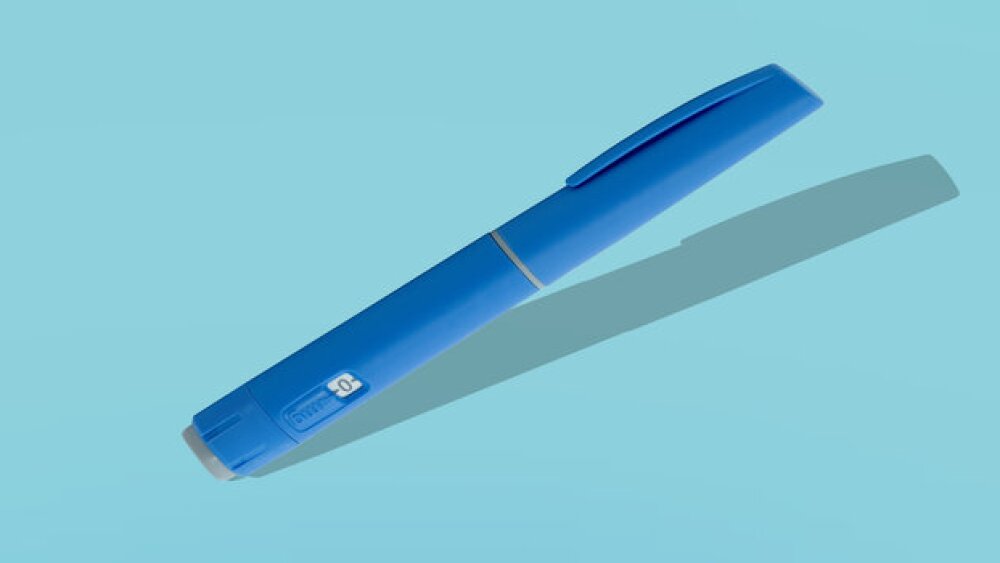A transformational moment in the treatment of depression, GSK takes first shot in a vaccine patent war with Pfizer, a Louisiana woman sues Novo Nordisk and Lilly, and companies face a steep COVID-19 cliff.
Pictured: A man in a suit examines drugs with a magnifying glass/iStock, MariaGisina
As I write this, we await one of the summer’s most highly anticipated FDA decisions: the regulator’s verdict on Biogen and Sage Therapeutics’ investigational drug zuranolone for the treatment of major depressive disorder and postpartum depression. The FDA’s action date is Aug. 5 and there’s reason to believe the fast-acting antidepressant pill will likely gain approval, which is great news for the estimated 1 in 8 women who experience symptoms of postpartum depression and are currently limited to a hospital-based IV infusion—also developed by Sage.
Another milestone this week was the CDC Advisory Committee on Immunization Practices’ recommendation for the use of AstraZeneca and Sanofi’s respiratory syncytial virus (RSV) antibody Beyfortus (nirsevimab) to immunize infants under eight months of age against the virus, as well as older babies through 19 months deemed to be at risk of severe RSV disease. It’s the first long-acting drug to protect infants and toddlers against a virus that sends tens of thousands of U.S. children to the hospital annually.
Also, on the RSV vaccine front this week, GSK filed a lawsuit against Pfizer for allegedly infringing on four patents related to the antigen used in GSK’s Arexvy shot. In a legal complaint, filed in federal court in Delaware, GSK contends that Pfizer’s RSV vaccine Abrysvo “knowingly uses GSK’s claimed inventions” without permission—with the former seeking monetary damages, including lost profits and royalties resulting from the alleged patent infringement.
GLP-1 receptor agonists were back in the news this week. A Louisiana woman on Wednesday filed a lawsuit alleging that Novo Nordisk’s Ozempic and Eli Lilly’s Mounjaro did not have warnings about the risk of severe gastrointestinal problems. The lawsuit alleges that while the companies “acknowledge that gastrointestinal events are well known side effects of the GLP-1 class,” they nevertheless never warned patients of the risk of more severe gastrointestinal events such as gastroparesis or gastroenteritis.
Safety concerns aside, these weight loss and Type 2 diabetes drugs may also help curb addictions. While research is still in its early days, BioSpace spoke with researchers about how the medications have the potential to target the same brain circuitry involved in addiction—including alcohol and opioid use disorders—as well as appetite control and regulating blood sugar.
Earnings season continued this week, with some major companies announcing financial results negatively impacted by the COVID-19 cliff. Pfizer’s drop in second-quarter revenue was steeper than estimated. Total revenues declined 54% for the quarter compared to the prior year, reflecting an operational decline of $14.7 billion or 53%—significantly more than the estimated $13.4 billion. As a result, Pfizer has cut the top end of its 2023 revenue range by $1 billion.
While Moderna reported that second-quarter sales of its COVID-19 shot dropped 94%, the company is hoping it can end the sales slump this fall with its updated vaccine targeting the omicron subvariant XBB.1.5. In fact, Moderna this week increased its expected sales for Spikevax to between $6 billion and $8 billion for the year, up from its previous forecast of $5 billion. At the same time, Chief Commercial Officer Arpa Garay acknowledged “it is difficult to accurately predict market volumes and predict how many Americans will come in this fall for their shots.”
Greg Slabodkin is the News Editor at BioSpace. You can reach him at greg.slabodkin@biospace.com. Follow him on LinkedIn.






